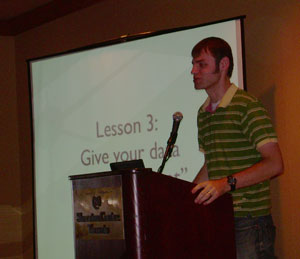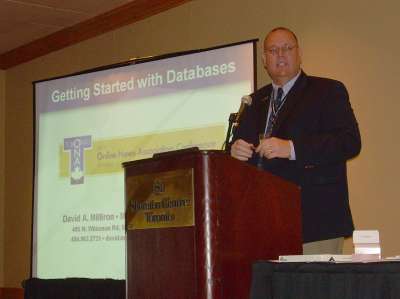 Live from the ONA conference in Toronto…
Live from the ONA conference in Toronto…
Adrian Holovaty looks at a photo of the world’s ugliest dog and sees 1s and 0s.
Displaying a photo of the hideous animal, Holovaty –the big brain behind ChicagoCrime.org and the Python framework Django— says there are loads of data in the ugly dog image. Who/what is the subject? Who took the photo? Where was it taken? When was it taken? What kind of camera was used? What colors are in the photos?
So how can that image, if tagged with metadata, give your site a big advantage? A good example is Flickr, which allows users to search photos by all sorts of non-traditional criteria. The result is a site that is stickier and allows a high degree of browsability, a trait that users nowadays are beginning to view as essential, Holovaty said.
News organizations have reporters attending city council meetings, high school sports games and covering local crimes — something Google doesn’t or can’t do. But rather than just having reporters gather facts and fuse them into a “blob” that is unreadable by machines (aka, a news story), Holovaty wants to also see news organizations compiling that information into a database format that can be easily browsed by users.
“We have all those killer advantages, but the tragedy is that we haven’t actually leveraged the information we collect,” Holovaty said.
How to get started
Being that crime databases are all the rage these days –no thanks to Holovaty– here is a set of processes and tips to get one rolling:
-Analyze the raw data you get from the police department.
-List the data’s fields (Date, time, crime type, address, etc.)
-Identify the key concepts. If a user clicks on a field, is it useful to that user to see the data sorted by that criteria? For instance, browsing by date ishelpful, but case numbers are unique and not really browseable.
-Make list pages with multiple records that are browseable by a certain criteria.
-Then, make detail pages for individual crimes.
-Every piece of information needs to have a permalink. Linkability/bookmarkability is critical, not just for users but also for search engines. “Your Google juice will go up,” Holovaty said.
 Live from the ONA conference in Toronto…
Live from the ONA conference in Toronto… Live from the ONA conference in Toronto…
Live from the ONA conference in Toronto… A coalition of small, niche community publications can become a premier source of news in Minnesota, says Jeremy Iggers, director of of the Twin Cities Media Alliance at
A coalition of small, niche community publications can become a premier source of news in Minnesota, says Jeremy Iggers, director of of the Twin Cities Media Alliance at